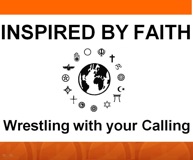Speaking openly about faith is tricky, particularly in our society which is sometimes called "post-religious." At a minimum, it opens one up to being typecast as a certain kind of person who unquestioningly believes one thing or another. At the extreme, it can shut down conversations, end relationships, bring-on persecution, or worse.
Social entrepreneurs feel particularly vulnerable in this regard given the intrinsic need to initiate dialogue and establish interpersonal networks in order to be effective change agents. Anything that poses the risk of raising walls rather than building bridges must be approached very cautiously, if not avoided altogether. Candid conversations about faith and spirituality often top the "don't go there" list.

So it was a rare and noteworthy occasion when five leading social entrepreneurs for whom spirituality is central to who they are and the work they do shared personal stories in a conversation entitled Inspired by Faith: Wrestling with your Calling at the recent 2012 Skoll World Forum on social entrepreneurship in Oxford UK. Kiva founder Matt Flannery; author David Bornstein; peacemaker Susan Collin Marks of Search for Common Ground; HeroRAT innovator Bart Weetjens; and educator Dr. Taddy Blecher of Maharishi Institute spoke candidly of their own foundations in a range of faith traditions, and offered wisdom on the spiritual practices they lean into when working to overcome the obstacles that are an inevitable part of changing the world.
Percolating like strong coffee at the nearby Vaults and Garden café, observations about faith as a supporting pillar and a life preserver for those pursuing some of humanity's most challenging tasks were unabashedly put on the table for contemplation.
- Spirituality is a place to come from, not a thing to do.
- We need to create space in our lives to let miracles happen.
- By staying in the "not knowing," we can take the time to let answers be revealed and discover where we need to go.
- Deep despair is often matched by profound hope, and how we respond is key to reaching our destination.
- We can feel attacks of happiness and experience atom bombs of love.
- Peace is a process.
Oxford provided a perfect historical backdrop for this discussion. Nearly 300 years ago at the university's Lincoln College, John Wesley drew up his General Rules which, in an economy of words, foreshadowed the ethos of many social entrepreneurs: Do no harm. Do all the good you can. Take advantage of the means of grace.

Each participant in the Inspired by Faith session was asked to offer an example of a "wrestling match" -- that is, a serious struggle encountered in the course of their journey -- and a spiritual practice that was instrumental for them in moving past it.
The stories of struggle were as profound as they were personal -- a no-holds-barred outpouring of experiences that ranged from the difficult to the devastating. Consider the horror of seeing loved-ones beaten to near death; abandonment by spouses and the loss of divorce; the pain of childhood bullying and losing friends; or the extreme disappointment of being cheated by trusted colleagues.
The unvarnished candor seemed more akin to what might be shared in a one-on-one, closed-door session with a clergyman or therapist than with a group of strangers. Yet, there it was -- unfiltered honesty that was unexpected and jarring, but also liberating and refreshing. It was as though the blunt force of the storytelling had broken down whatever fear and reservations those of us in the room -- including a Mormon VC from Silicon Valley, a Brazilian medical doctor, an African Ph.D., a Methodist minister from Texas, an NGO executive working in Jordan, and many others -- were holding onto.
The spiritual practices employed in the daily lives of these social entrepreneurs offer lifelines for getting up, over, around roadblocks large and small. The Pixies sang, "If man is 5, then the devil is 6, and God is 7" and, perhaps not coincidentally, 7 practices resonated with me.
1) Meditation. Reserving time each day to be deliberately attentive to our connection with God through the focus on being "in the now" can bring intense happiness, more control to deal positively with our circumstances, the ability to withhold judgment in the moment, and the sense of being truly free.
2) Power of Nature. Going to "the bush" (specifically, immersing ourselves in nature by visiting the forest, the mountains, the seacoast, etc.) for solo contemplation or group dialogue can free us from the noise of everyday life and offer the opportunity to reconnect with the Earth, the spiritual realm, and each other around the proverbial campfire.
3) Spiritual Mentors. Having a role model or a peer on the same wavelength who has empathy for our journey can give us stamina and help maintain our true north.
4) Dreams. Paying attention to dreams -- for example, investing the time to reflect on what we experience in our dreams and considering before going to sleep the questions we wish to be answered while dreaming -- can help create connections between the everyday and spiritual dimensions.
5) Touchstones. Activating our physical senses and engaging our memory through tactile objects such as stones, shells, or seeds that can be kept or given away may provide a material connection to the healthy and productive spiritual places we need to be.
6) Release Attachment. Letting go of possessions -- including physical and habitual things that give transient comfort -- can help us to find happiness and see the good in the most difficult places and circumstances.
7) Stories of Grace. Carrying with us the stories of people who have navigated significant challenges and emerged better equipped to pursue their calling can give the courage, inspiration, and methods by which to take on and overcome our own trials.

Again, spirituality is a place to come from, not a thing to do. The willingness to leave behind well-worn practices that may amount to little more than checking the spiritual box in favor of fresh ways to ignite the connection with that something greater than ourselves requires the motivation and fortitude of, well, social entrepreneurs.
Ask them. They've been there. They know.
Please comment with your own spiritual practices to continue building this list.
Alex Hofmann is a founder of DAC Digital Media, a boutique consulting practice that helps socially- and culturally-oriented media organizations generate mission-aligned revenue through licensing and distribution partnerships. He is also founder of Changents.com, a social-media driven storytelling platform dedicated to helping a global network of Change Agents connect with people, organizations, and companies that want to support their work.